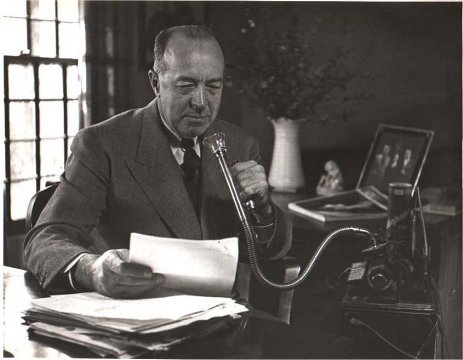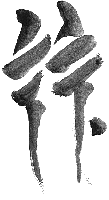
Official Edgar Rice Burroughs Tribute and Weekly Webzine Site Volume 8059 |

Misogynists Preferred
Part 2

By Edgar Rice Burroughs (As John Tyler McCulloch)
Written January, 1941

The yacht Henry VIII passed through the Panama Canal a few weeks later and headed out across the vast Pacific, bearing five happy, carefree misogynists to the land of their dreams, to an Eveless Garden of Eden; to a place of peace, sans gabble, lipstick, red toenails, permanents, and perfume at forty dollars a drop; and after an uneventful cruise dropped anchor in a little natural harbor that indented the coast of a green, volcanic isle.
“This is Heaven,” exclaimed Myron Perry; “not a skirt; not even a grass skirt. Why should any man want to marry when he can find a place like this?”
“‘Every woman should marry–and no man.’–Disraeli.” quoted Fortesque.
The next day they started digging.
—
The Naiad had stopped at Honolulu just long enough to take on additional provisions; but even this had been too long–long enough to reveal a rift in the lute, the first discord in the sweet music that had prevailed for three heavenly weeks: Hibiscus had discovered a beautiful beach boy. As they sailed south, Hibiscus was a pariah among women. But she took it in her stride; she had memories.
“W’ich,” she said to herself in the privacy of the galley, “is a damn sight more’n they-all’s got.”
They sailed south aimlessly; they were not looking for land, for there there would be men.
“How Heavenly!” exclaimed Shanly Lawrence ecstatically and for the thousandth time; “the blue Pacific! So calm! So peaceful!” And the next day the Pacific turned a dull gray and stood up on end. The wind shrieked and howled through the rigging for three awful days, and the Naiad did everything but a barrel roll. Hibiscus came near achieving a lifelong ambition; she went almost white. She prayed; she even regretted the beach boy.
They all fought with sails until they were exhausted; and then the hurricane, just to show them what a waste of time it had been, picked up the mast and all the sails and carried them away with a wild, ungentlemanly whoop. That night five very terrified man haters crouched in the cabin and awaited death.
About midnight, the hurricane went helling off to pastures new; and when dawn peeked a pale eye over the eastern horizon, the ocean had returned to a more or less horizontal position.
The five dragged themselves wearily on deck to inspect the devastated area. A few sad rope ends trailed dejectedly in the ocean–all that was left of the rigging of the once trim little sloop.
“Well,” said Minerva Johnson, “we still have the auxiliary motor, and if land isn’t too far off we can–”
“Look!” exclaimed Shanly excitedly. “Land!”
They all looked, and sure enough there was land–a green volcanic isle not more than a mile away, and a gentle breeze was drifting the Naiad toward it.
“We’ll start the motor,” said Minerva, “and see if we can find a sheltered place to anchor.”
The motor started; and Minerva took the wheel to bring the Naiad about, as she was drifting toward the island stern first. The wheel spun, but nothing else happened. The sloop started out to sea again, ignoring the helm. They stopped the engine and investigated, to discover that they had lost the rudder during the storm. The Naiad was a helpless derelict.
Myron Perry, coming down to the beach for a swim before breakfast, saw something drifting out at sea. He called to the others and they came and joined him.
“It’s a derelict,” said Alexander.
“There’s someone on it.” said Allan White.
“We’d better row out and tow her in,” suggested Perry, “before she goes ashore.”
They rowed out, all five of them; and the women on the Naiad watched them come.
“Men!” sniffed Minerva.
“Men!” exclaimed Hibiscus.
As the boat approached the sloop, John Alexander said, “My God! a woman!”
“My God! five of ’em!” said Perry.
“‘A rag, a bone, and a hank of hair’–Kipling,” said Cyril Fortesque.
“One of ’em’s a niggah wench,” said James, and then he added. “Stay where you is, razor; don’ tempt me.”
The women on the deck of the Naiad were appraising the five men, four of them scornfully.
“One of dem mens is a culled ge’m’n,” said Hibiscus, arranging her hair.
“Man, false man, smiling, destructive man!” quoted Shanly Lawrence.
They might be false and destructive; but they were not smiling, as they pulled in alongside the sloop. John Alexander looked at Minerva Johnson. “Throw us a rope,” he said, brusquely, “and we’ll tow you into the harbor.”
Minerva’s “Thank you” might have been packed in dry ice. Hibiscus tried to throw a rope to them and got tangled up in it.
“Are there no men on board to do that?” demanded Myron Perry.
“Certainly not,” snapped Minerva, for all the world as though he had asked her if she had small pox or an illegitimate child.
“I know what happened to ’em,” ventured Allan White in a voice loud enough to be heard aboard the sloop; “they jumped overboard. Think of being cooped up on that thing with five women!”
The five men towed the Naiad into the little harbor, and the women dropped anchor alongside the Henry VIII. The men were tired and not a little irritable, for by now the sun was hot.
“Madam,” said John Alexander to Minerva, “you and your party will remain on board your yacht. If you want anything from shore, I will have it brought out to you.”
“If we want anything on shore, we’ll come and get it,” retorted Minerva.
“You will not,” snapped Alexander; “women are not allowed on this island.”
“Very well,” said Minerva icily; “and you will please understand that no men are allowed aboard my yacht.”
“It will be necessary for some of us to come aboard later to make needed repairs, so that you can get out of here as quickly as possible.”
“I shall stay here until the Naiad rots before I shall permit any man to come aboard, and we shall most certainly not step foot on your island.” In spite of herself, Minerva’s voice had gradually risen during this speech until, at the end, she knew that she sounded like a fishwife and that made her all the madder.
“Is that a promise?” demanded Myron Perry.
“‘As soon believe a woman or an epitaph, or any other thing that’s false’–Byron,” chanted Fortesque.
Shanly Lawrence looked over his head at the island. “A very lovely spot,” she said, “where ‘every prospect pleases, and only man is vile’–Reginald Heber.”
Hibiscus smiled coyly at James, but he gave her such a venomous look in return that she withdrew behind Minerva. “Dat’s de meanes’ lookin’ culled ge’m’n Ah almost nea’ly ever seen,” she remarked later.
“We shall find a suitable tree, fell it, and shape a new mast on shore; then we shall have to come on board and step it. I will not have you around here indefinitely. You had no business coming here in the first place.” John Alexander’s tone was definite, final, and frigid.
Calida leaned over the rail as the men started to pull away. She shook a fist at them. “You come on thees boat, I keel you,” she screamed: “we got plenty guns and bullets.”
“Oh, woman, woman! when to ill thy mind
Is bent, all hell contains no fouler fiend.
–Pope,” said Cyril Fortesque.
—
Weeks passed during which nothing but malignant looks passed between sloop and shore. The mast was completed; the day that the men planned to face bullets to step it dawned windless, stifling, and ominous. The sky was a greenish copper color.
“We are going to have a blow,” remarked Alexander.
“We are going to have a hell of a blow,” said Perry; “we’d better wait until it’s over.”
An hour later the full force of the hurricane bore down upon the island. When it was over, the Henry VIII lay bottom up two hundred feet in shore; beside it, with its back broken, lay the sloop Naiad.
Miraculously, no one had been injured.
Let us, with charity, draw an impenetrable veil across the ensuing eighteen months during which five misogynists and five man haters were compelled to live together on a lonely volcanic isle.
—
Excerpt from the log of the SS Westwind:
<>About ten o’clock this morning saw smoke arising from the island of Nui Papaya, supposed to be uninhabited. Stood in and sent boat ashore. Found castaways from the wrecked yachts Henry VIII and Naiad. They asked to have a ship sent with stores and provisions, a list of which they gave me. I offered to evacuate them, but they refused to leave island. There were fifteen people on the island: five men, five women, and five babies, one of them black.—
Epilogue
by Cyril Fortesque, née Henry Stubbs
<>Woman’s at best a contradiction still.
–Pope

BILL HILLMAN
Visit our thousands of other sites at:
BILL and SUE-ON HILLMAN ECLECTIC STUDIO
ERB Text, ERB Images and Tarzan® John Carter® Priness of Mars® are ©Edgar Rice Burroughs, Inc.- All Rights Reserved.
All Original Work ©1996-2025 by Bill Hillman and/or Contributing Authors/Owners
No part of this web site may be reproduced without permission from the respective owners



